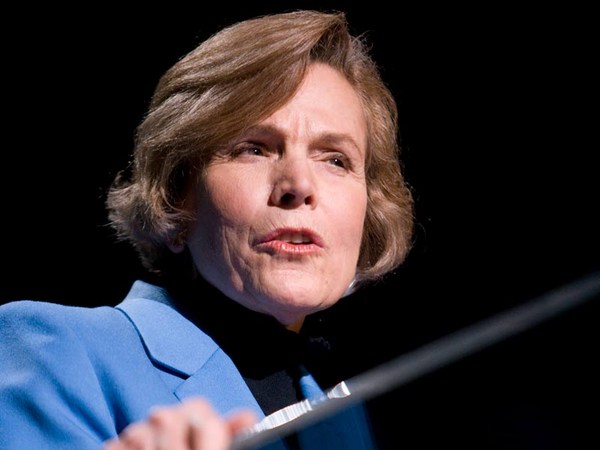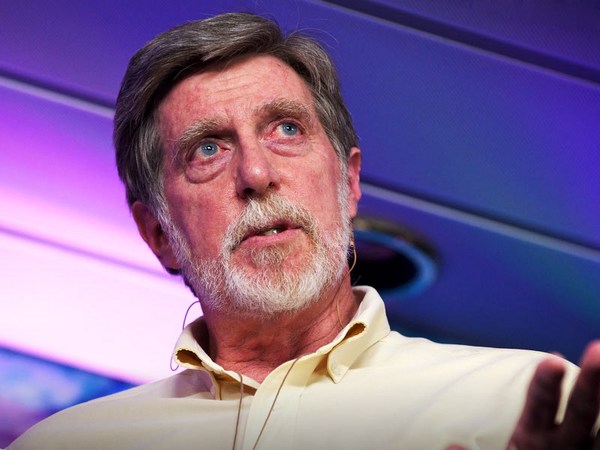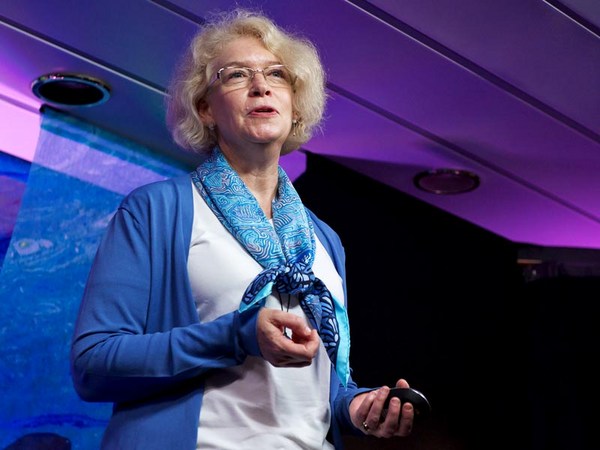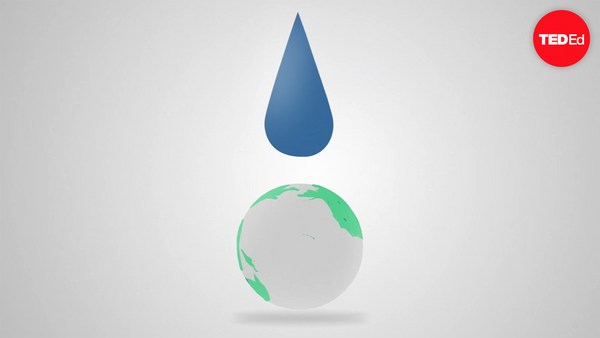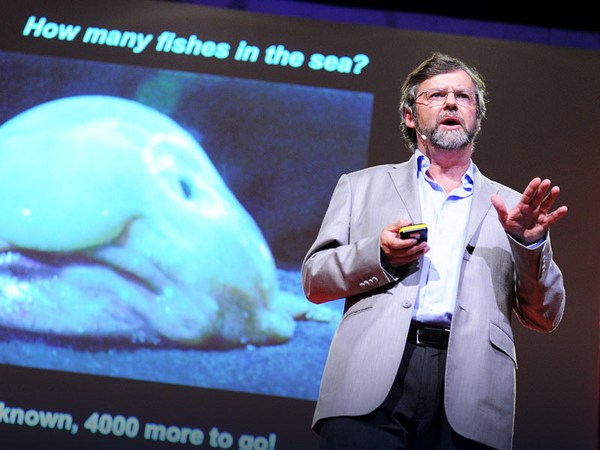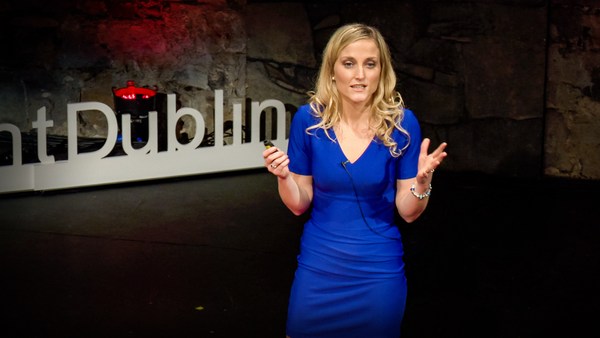Buenas tardes. Good afternoon. I can’t see all of you, but I do want to take this in. I was one of the first students here on campus, way long back ago. This building wasn't even here. The old student union was the library, cafeteria, meeting space. And you were the dream of us that we're here on campus. And it's really lovely to see you all here and have community members here with you, with us, so thank you so much.
So, in my line of work, a lot of people ask me, “Jenny, what’s the future of the ocean? What’s the future of ocean conservation? What’s the future of ocean science?” And you may ask me, “What is it that you do?” I kind of think of myself as a person who develops people. I also work at the intersection of science and social justice. So at this intersection, I often think about what the future's going to be like. And I really do think the future of the ocean is intersectional.
When I first started doing this work many years ago, dinosaurs roamed. There weren’t a lot of people that had my background experience, or that were Latinx, or that didn't speak English as their first language, or didn’t have ADHD or other things. I felt really alone when I first came. And so today, what I want to talk to you about is why I think intersectionality is the way that the future is going to be and how the future is here today with the leaders that we have.
So, like I said, I came to this, and I walked into many spaces, marine science spaces. I remember one time going to a conference, and I walked up to a couple of scientists, and I was being the brave college student that I wanted to be. And I said, “Excuse me, what does W-H-O-I mean?” And they looked at me like - And for those of you that are not into ocean science, basically, I was asking someone, like, who is new at world wrestling. I was asking this. They’re the WHOI, and they are, like, the biggest ocean science people. And they were like, “It’s WHOI.” And they continued on with their conversation.
So I said, "What the heck am I doing here? What am I doing here?" Then, “I don’t look like this guy.” This guy here is one of the coolest people I know. He collects sharks. He goes out to the deep sea, collects specimens, he looks for jellies. He tries to figure out how to keep them alive. I definitely don’t do that.
I'm not as cool as this girl. This girl is not only, like, a diver, but she also now teaches people how to do their jobs really well. She’s just cool, and she knows how to dive. I don’t even know how to swim.
Definitely not this person. She's so wonderful, inspired millions of people around the world to actually do ocean conservation. This is how cool Julie Packard is. For those of you that are Latinx and know the group Maná - to give a context, they're kind of the U2 of the Latino-American world, at least back in the nineties and early aughts - yes, I’m dating myself. They got to meet her. And when we went to a concert, they invited her back and had their own greenroom just to sit with her and talk about ocean conservation.
And I’m definitely not this dude. And for those of you that are my generation and older, probably recognize him. He’s Jacques Cousteau. And he’s actually the reason I really got into all of this.
So what could I - this person who learned to love the ocean on TV. Yeah, I didn’t even have the ocean around me. I’ll tell you a little bit more about that. How do I get into this? What am I doing here? How does a one and a half Colombian immigrant get into this space? One and a half means I was born in Colombia, but I grew up here in the United States. So I kind of dither between both worlds: I’m not fully Colombian or fully American. What do I - a person that didn’t even know how to swim - what do I have to offer? Ocean science and ocean conservation. And what about me? What do I - I am literally allergic to the outdoors. I have to take two allergy pills to actually go outside. And I’m allergic to hiking. I hate it.
(Laughter)
So what do I - I don’t get it. My friends always: “Let’s go.” “I’m not walking anywhere unless it’s a mall. I’m just telling you right now.” But what do I have to do with ocean science? What can I contribute to this?
Well, let me tell you where it all began. This is a wonderful, beautiful place called Colombia. And it's in South America. “La Tierra del Encanto.” “Encanto” trademarked by another company I cannot name. As you can see, it’s a beautiful land we have. And the Andes there, we have “llanos,” we have oceans, we have coasts. And it is in this beautiful land of Colombia that Federico de la Hoz and Miriam Hernandez, that’s where they met, and that’s where I was born. My father was born in Barranquilla, Colombia, on the coast. You can see that there’s actually coastline and a river. My father once told me that - a story about how he and his best friend tried to cross El Rio Magdalena. And it was so broad. They took all day and only made halfway, and they had to swim back as they were worried they were going to get tired. He was the one that always reminded me, especially when I started working in ocean science,
(Speaking Spanish)
This ocean is in our blood. My mom, on the other hand, was born in Bogotá, Colombia. Imagine a city, a metropolitan city surrounded by volcanoes, extinct volcanoes. And the houses are literally built right up into the mountains. This is where I was born. But it’s not where I grew up.
I grew up in Paterson, New Jersey. Paterson, New Jersey has often been labeled the little New York of New Jersey. We’re not far from New York City. Really close. As close as an hour will take you, but that usually means a lot of traffic. And it’s crime ridden. And as you can see, it actually doesn't have a lot of green spaces. There are some spaces. But for the most part, the place that I grew up in, this building, there were a lot of green spaces right there.
And the water, the ocean? The way that we had water, except for that one week a year that my mom took off from working in the factory, and we would go down to the "shaw," because that's how you say it in Jersey. When we would go down to the shore, the only way we would get to water was this way. The firemen would come, open the fire hydrant, and we would just go crazy and just love it. And I thought that when I was waiting in the gutters, that I was actually swimming. I wasn’t. And I think back on it now, and I’m like, “What was I thinking?” But this is the way that I was exposed to water, to nature. And so what did I have to do with this?
Well, this is how it all started. I was nine years old. Sundays my families got together, a wild world of wonder. And then Jacques Cousteau enters into the Amazon. My parents turn to me and say, “The Amazon goes through Colombia.” Well, I hadn’t been to Colombia very often. It’s very expensive to go. So I was like, “Yes.” And he was wandering through, talking about all the different things that they were discovering and all the things that they were seeing. And then he showed me this. It is a pink water dolphin. OK. First, it’s dolphins. Because every girl who ever falls in love with the ocean is always about dolphins. Always. Or whales. But then it was pink. And then he talked about how it was blind, and how it navigated using sonar through all of the intricate routes that happen in the Amazon River. I was hooked. I was hook, line and sinker. I took the whole thing. And I did everything in my power to learn as much as I could about the ocean. My senior year in high school, my biology teacher gave me a book on marine biology because I was so in love with the idea.
So given my past, my experience, what can I bring to ocean science? Well, I’ve learned quite a few things in my time. And what I've learned is because I learned to love science, and the ocean specifically, through television, I know what's exciting and what gets people really interested in those moments, like knowing that penguins have spiny tongues to help them slide the fish down their throats. That’s exciting for kids to know. Or explaining how sea stars are actually regurgitating their stomachs to slurp things back in here. That’s exciting for kids to know.
Because English was not my first language, and the ocean wasn’t close to me, I was able to use my ocean experiences to then explain to others how the ocean looks like underneath. Because I didn’t come learning those things, and it wasn’t part of my natural experiences. So I was able to explain it. And in the picture that I'm showing, I’m in front of this beautiful kelp forests exhibit with my best friend who doesn’t speak a lick of Spanish. And she was trying to guess what I was saying in Spanish. So I’m able to explain in a different language that “algas,” “no nalgas,” are actually really important for the ocean. And if you don’t know what a “nalga” is, I recommend you talk to your Latinx friend, and they will tell you all about it.
Because I did not come from the ocean, I was able to do things that other people were not able to explain. And because I didn't know how to swim, I knew what it was like for the first time to go out in a boogie board. I could walk my girls out into the water, and if they were scared, understand where they were coming from. Allay their fears, allay their parents' fears, who were putting their wonderful daughters' lives into my hands so that I can teach them to go explore the water.
And because I was able to do all this, I was able to meet other people. Often I felt very alone, very isolated in my experience as a Latina, as an English language learner. And then I discovered that there were indigenous black women, white women that were doing this work of all generations, of all ages, all different types of experiences. And I learned that I needed to walk with the next generation of ocean leaders, start talking to them as soon as they started discovering their voice, to help them see themselves in the work.
So, I want to start introducing you to people that are my colleagues, my friends that are the next emerging leaders of ocean science and ocean conservation.
Luis David Calderon is a dreamer in every possible sense of the word. He always teaches me that the only barriers that we have to ocean science are the barriers that we create in our heads. He's a D&D master and amazing artist, and he just is brilliant in every possible way. If he doesn't know it, he'll own up to it, and he will go and learn it.
Maya Canonizado. She’s heart. Maya lost her mom at the age of 17, and in losing her mother, a very important figure for her, she suddenly became the mother to her youngest sister. So often when Maya does her work in policy, she looks back to her mother to make sure she’s representing her correctly and looks forward to her sister to make sure she’s creating the world she wants her sister to live in.
Christian. It’s just joy. That’s all you see when you see him. He talked about his experiences that he was very protected as a child because his parents were scared to bring him out to nature, to go hiking or even to the beach. Those of us that grew up with immigrant parents know, that's just part of knowing, that they're scared about what the world has that they can't control. And yet, he's used these opportunities to expand other horizons, not only for himself, but also for others. And I love that he has acknowledged and builds on the fact that others have paved the way for him as he continues to pave the way for others.
Roberto is my contrarian. He loves to learn, and he also likes to be the devil's advocate. I love this because he comes in and always tries to look at the other side of things. For me, that’s a really important thing, especially in this world where often when we see someone that doesn’t agree with us, we automatically make them the evil one. Roberto reminds me that it’s okay to think differently.
And finally, my wonderful goofball and joyous friend, Gina Carillo. She reminds me every time that I need to take care of myself. For anyone who's done this work and feels isolated and alone, you often feel that you are wearing down. I heard one of the previous speakers said overwrought or tired and burned out. That’s real. Gina reminds me that the only way we can continue to do this work is if we go ahead and take care of ourselves.
So the future of the ocean. What is it? Well, I think if we borrow Maluma, and that’s the next singer that I recommend people listen to, if you borrow his term “sos vos” or “sé vos”, it means “it’s you.” You are the future of the ocean. You’re the future of ocean conservation, ocean science. But most importantly, bring your voice. Bring all of you, all of who you are, every aspect of your identity. You don't have to be what other people have been. You can be yourself in this place. What I think I want everyone to walk away with this is that people will tell you don’t belong, and I want you to tell them that’s not true. You belong because you feel you belong. And I’m here to tell you that all of my experiences that told me I didn't belong actually helped me in the process and helped me open doors and walk with colleagues.
So what are you going to bring to ocean science? You don’t have to be a scientist. You don’t have to be a conservationist. You can do many, many things. What are you going to bring to the next generation of ocean?
Thank you.
(Applause)
